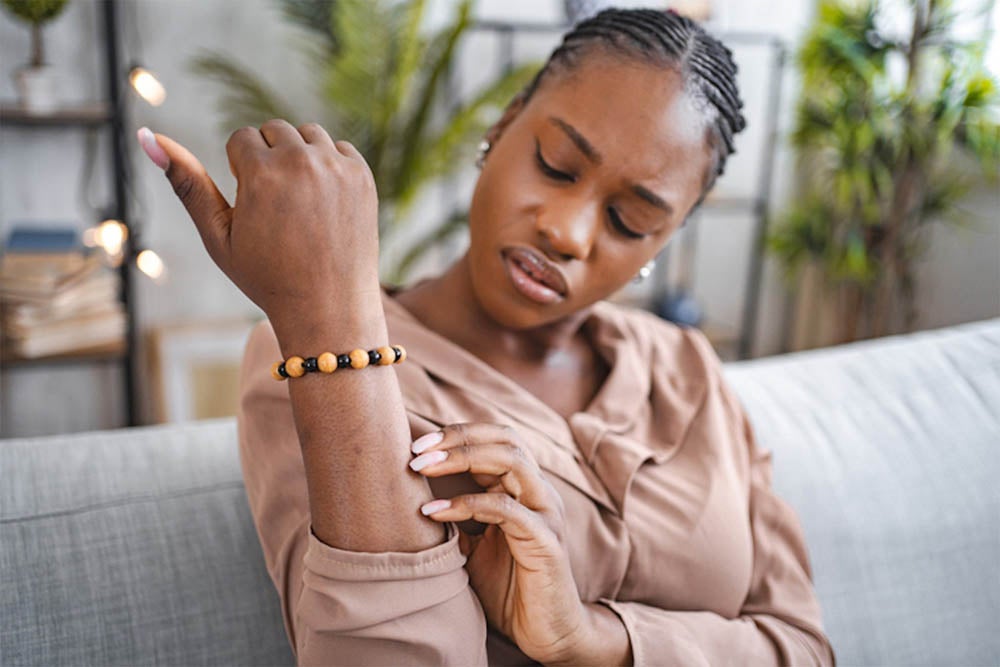Managing eczema

Eczema is an inflammatory skin condition. It can cause dry, itchy skin; scaly patches; skin infections; and rashes.
There are seven different types of eczema:
- Atopic dermatitis
- Contact dermatitis
- Dyshidrotic eczema
- Neurodermatitis
- Nummular eczema
- Seborrheic dermatitis
- Stasis dermatitis
Atopic dermatitis is the most common form of eczema. It’s possible to have more than one type of eczema at the same time. This article will describe risk factors, triggers and treatment for this common condition.
Symptoms
People with eczema may experience some or all of these symptoms:
- Itchiness
- Rough, scaly patches of skin
- Dry, sensitive skin
- Oozing or crusting
- Swelling
- Areas of discolored skin
Typically, people with eczema may go through periods of more intense symptoms. Such periods are known as “flares” or “flare-ups.” Flares can last for days or weeks.
Eczema is a chronic condition, meaning it can last a long time. Many children outgrow it by the time they’re teenagers. However, some people can have it their whole lives.
Eczema is not contagious. It cannot spread to others.
Risk factors and triggers
Eczema is a common condition, affecting 31 million people in the United States.
It often begins in childhood, however it can start at any age. Many children outgrow eczema. But it can continue into adulthood. Some people even develop it for the first time as adults.
Risk factors for eczema include:
Genetics: It is often related to allergies and asthma. Children whose parents have allergies or asthma are most at risk for developing eczema. It can appear as early as infancy and often starts before the age of 5.
Overactive immune system: An immune system that’s triggered by irritants or allergens. Instead of mounting an immune response to things that can make you sick, an overactive immune system reacts to other triggers. This can cause inflamed skin.
Factors that can trigger eczema flares include:
- Environmental triggers: chemicals in laundry detergents; scented lotions, body washes, candles; itchy fabrics
- Allergens: like pet dander or dust mites; or foods, such as eggs and milk
- Weather: cold, dry air; or hot, humid weather that causes sweating
- Emotional triggers: stress can trigger eczema flares, as can anxiety and depression
Treatment
There is no cure for eczema. However, it’s a condition that can be managed. Proper treatment can keep eczema from getting worse.
The main steps of eczema management are:
- Understand triggers.
- Keep skin moisturized.
- Prevent damage through scratching.
- Use over-the-counter and prescription medicines as prescribed.
- Watch out for skin infection.
Proper bathing can be one strategy for keeping skin healthy and moisturized. Take a short (5-10 minute) bath in lukewarm water daily. Use a gentle (non-soap) cleanser, without fragrances or dyes. A doctor can recommend bath add-ins to target specific needs.
Post-bath care is key to restoring moisture to dry skin. This method is called “soak and seal.”
- Pat the skin dry, but leave it damp.
- Apply any topical creams to areas of eczema, as directed by your doctor.
- Liberally coat with an eczema-friendly cream or moisturizer while skin is still damp.
An extra step to lock in moisture called wet wrap therapy may also be helpful. Talk to a doctor to learn more about this option.
Scratching itchy skin may provide instant relief, but it leaves skin open to infection. Here are some ways to reduce itchiness and reduce harm from scratching:
- Keep fingernails short
- Try pinching itchy skin, rather than scratching it
- Cover itchy skin with soft, loose-fitting clothing
Prescriptions
- Topical: Topical steroids, whether over-the-counter or prescription, are the most common topical medications used to treat eczema. Steroids can reduce inflammation and itchiness.
- Oral: Antihistamines may be used to control allergy symptoms that can increase itchiness
- Injectable: These biologic medications can block the immune response to eczema triggers
- Phototherapy: UV light therapy can improve eczema
The best treatments for eczema vary by individual. It can also take some trial and error to uncover what’s best. Be patient—and get the support you need. Partnering with a dermatologist is key to getting (and keeping) eczema under control.
Sources
1. American Academy of Dermatology. Eczema: Overview.
2. National Eczema Association. What is eczema? .
3. Centers for Disease Control and Prevention. Eczema (atopic dermatitis).
4. Weidinger S, Novak N. Atopic dermatitis. Lancet. 2016;387(10023):1109–1122. doi:10.1016/S0140-6736(15)00149-X.
5. American Academy of Dermatology. Eczema treatment.
6. National Institute of Arthritis and Musculoskeletal and Skin Diseases. Atopic dermatitis (eczema).
Was this article helpful?
Don't wait! Unlock a healthy, happy new year, at no cost to you.
This content is not intended to be a substitute for professional medical advice, diagnosis or treatment. Always seek the advice of your physician or other qualified health provider with any questions you may have regarding a medical condition.
